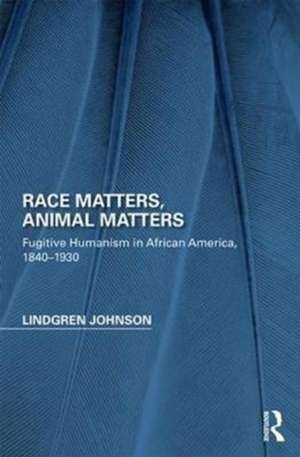Race Matters, Animal Matters: Fugitive Humanism in African America, 1840-1930: Perspectives on the Non-Human in Literature and Culture
Autor Lindgren Johnsonen Limba Engleză Hardback – 10 noi 2017
Fugitive humanism reveals how an interspecies ethics develops in these African American responses to violent dehumanization. Illuminating those moments in which the African American canon exceeds human exceptionalism, Race Matters, Animal Matters ultimately shows how these black engagements with animals and animality are not subsequent to efforts for racial justice — a mere extension of the abolitionist or antilynching movements— but, to the contrary, are integral to those efforts. This black- authored temporality challenges widely accepted humanist approaches to the relationship between racial and animal justice as it anticipates and even critiques the valuable insights that animal studies and posthumanism have to offer in our current moment.
| Toate formatele și edițiile | Preț | Express |
|---|---|---|
| Paperback (1) | 271.20 lei 6-8 săpt. | |
| Taylor & Francis – 29 iul 2019 | 271.20 lei 6-8 săpt. | |
| Hardback (1) | 1108.37 lei 6-8 săpt. | |
| Taylor & Francis – 10 noi 2017 | 1108.37 lei 6-8 săpt. |
Din seria Perspectives on the Non-Human in Literature and Culture
-
 Preț: 281.27 lei
Preț: 281.27 lei -
 Preț: 387.38 lei
Preț: 387.38 lei -
 Preț: 386.61 lei
Preț: 386.61 lei - 18%
 Preț: 1029.41 lei
Preț: 1029.41 lei - 5%
 Preț: 370.18 lei
Preț: 370.18 lei -
 Preț: 365.49 lei
Preț: 365.49 lei -
 Preț: 384.27 lei
Preț: 384.27 lei -
 Preț: 384.02 lei
Preț: 384.02 lei -
 Preț: 389.66 lei
Preț: 389.66 lei -
 Preț: 386.61 lei
Preț: 386.61 lei -
 Preț: 389.38 lei
Preț: 389.38 lei -
 Preț: 386.30 lei
Preț: 386.30 lei -
 Preț: 380.45 lei
Preț: 380.45 lei -
 Preț: 384.09 lei
Preț: 384.09 lei -
 Preț: 389.66 lei
Preț: 389.66 lei -
 Preț: 367.61 lei
Preț: 367.61 lei -
 Preț: 381.21 lei
Preț: 381.21 lei -
 Preț: 389.66 lei
Preț: 389.66 lei - 16%
 Preț: 262.96 lei
Preț: 262.96 lei -
 Preț: 387.83 lei
Preț: 387.83 lei - 18%
 Preț: 1169.97 lei
Preț: 1169.97 lei - 18%
 Preț: 1003.89 lei
Preț: 1003.89 lei -
 Preț: 433.86 lei
Preț: 433.86 lei -
 Preț: 385.41 lei
Preț: 385.41 lei - 16%
 Preț: 311.73 lei
Preț: 311.73 lei - 17%
 Preț: 257.49 lei
Preț: 257.49 lei - 17%
 Preț: 271.20 lei
Preț: 271.20 lei - 18%
 Preț: 1002.36 lei
Preț: 1002.36 lei
Preț: 1108.37 lei
Preț vechi: 1351.68 lei
-18% Nou
Puncte Express: 1663
Preț estimativ în valută:
212.08€ • 222.03$ • 175.49£
212.08€ • 222.03$ • 175.49£
Carte tipărită la comandă
Livrare economică 05-19 aprilie
Preluare comenzi: 021 569.72.76
Specificații
ISBN-13: 9781138954540
ISBN-10: 1138954543
Pagini: 212
Ilustrații: 18
Dimensiuni: 152 x 229 x 16 mm
Greutate: 0.43 kg
Ediția:1
Editura: Taylor & Francis
Colecția Routledge
Seria Perspectives on the Non-Human in Literature and Culture
Locul publicării:Oxford, United Kingdom
ISBN-10: 1138954543
Pagini: 212
Ilustrații: 18
Dimensiuni: 152 x 229 x 16 mm
Greutate: 0.43 kg
Ediția:1
Editura: Taylor & Francis
Colecția Routledge
Seria Perspectives on the Non-Human in Literature and Culture
Locul publicării:Oxford, United Kingdom
Public țintă
Postgraduate and UndergraduateCuprins
Table of Contents
Introduction. Fugitive Humanism in African America
Chapter 1. Scenes of Slave Breaking and Making in Moses Roper’s and Frederick Douglass’ Slave Narratives
Chapter 2. "To Admit All Cattle without Distinction": Reconstructing Slaughter in the Slaughterhouse Cases and the New Orleans Crescent City Slaughterhouse
Chapter 3. Strange Fruits: Conjure, Slaughter, and The Politics of Disembodiment in Charles Chesnutt’s The Conjure Woman and Related Tales
Chapter 4. Wolves in Sheep’s Clothing: Hunting and Domestication in Spectacle Lynchings
Chapter 5. Interspecies Welfare and Justice: Animal Welfare and the Anti-Lynching Movement
Epilogue. Sanctuary and Asylum
Introduction. Fugitive Humanism in African America
Chapter 1. Scenes of Slave Breaking and Making in Moses Roper’s and Frederick Douglass’ Slave Narratives
Chapter 2. "To Admit All Cattle without Distinction": Reconstructing Slaughter in the Slaughterhouse Cases and the New Orleans Crescent City Slaughterhouse
Chapter 3. Strange Fruits: Conjure, Slaughter, and The Politics of Disembodiment in Charles Chesnutt’s The Conjure Woman and Related Tales
Chapter 4. Wolves in Sheep’s Clothing: Hunting and Domestication in Spectacle Lynchings
Chapter 5. Interspecies Welfare and Justice: Animal Welfare and the Anti-Lynching Movement
Epilogue. Sanctuary and Asylum
Notă biografică
Lindgren Johnson is Assistant Professor at the University of Virginia, USA.
Descriere
This book challenges the grand narrative of African American studies: that African Americans rejected racist associations of blackness and animality through a disassociation from animality. Taking an animal studies approach to texts written by Frederick Douglass, Charles Chesnutt, Ida B. Wells-Barnett, and James Weldon Johnson, among others, Johnson argues instead that this literature, at pivotal moments, reconsiders and recuperates discourses of animality (and often animals themselves) weaponized against African Americans, thus undermining the binaries that produced racial—and animal—injustice.
